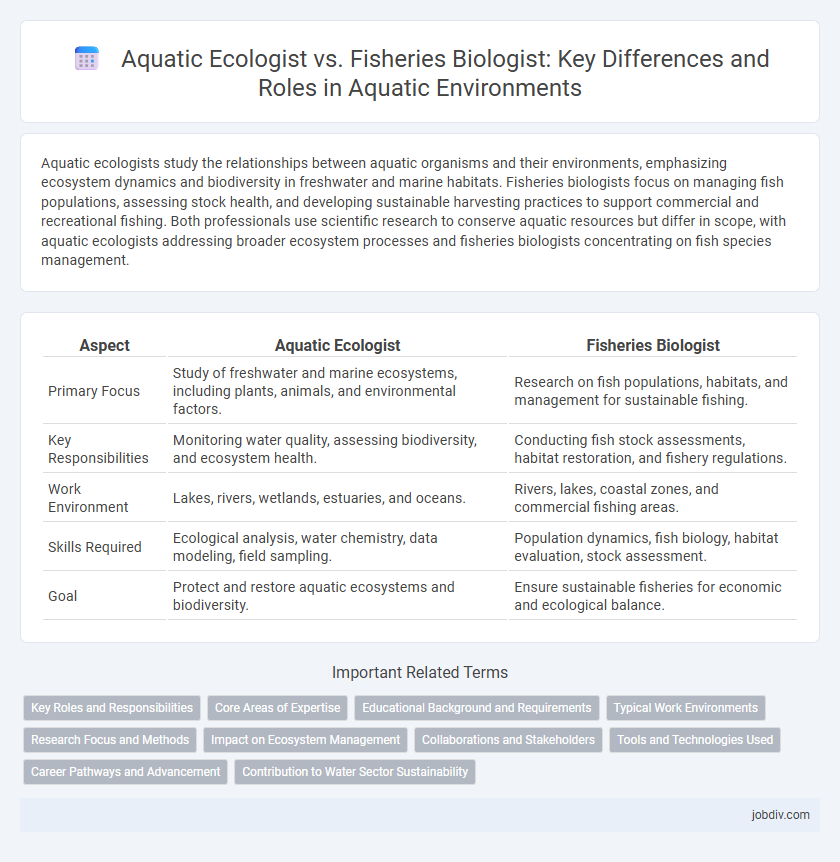Aquatic ecologists study the relationships between aquatic organisms and their environments, emphasizing ecosystem dynamics and biodiversity in freshwater and marine habitats. Fisheries biologists focus on managing fish populations, assessing stock health, and developing sustainable harvesting practices to support commercial and recreational fishing. Both professionals use scientific research to conserve aquatic resources but differ in scope, with aquatic ecologists addressing broader ecosystem processes and fisheries biologists concentrating on fish species management.
Table of Comparison
| Aspect | Aquatic Ecologist | Fisheries Biologist |
|---|---|---|
| Primary Focus | Study of freshwater and marine ecosystems, including plants, animals, and environmental factors. | Research on fish populations, habitats, and management for sustainable fishing. |
| Key Responsibilities | Monitoring water quality, assessing biodiversity, and ecosystem health. | Conducting fish stock assessments, habitat restoration, and fishery regulations. |
| Work Environment | Lakes, rivers, wetlands, estuaries, and oceans. | Rivers, lakes, coastal zones, and commercial fishing areas. |
| Skills Required | Ecological analysis, water chemistry, data modeling, field sampling. | Population dynamics, fish biology, habitat evaluation, stock assessment. |
| Goal | Protect and restore aquatic ecosystems and biodiversity. | Ensure sustainable fisheries for economic and ecological balance. |
Key Roles and Responsibilities
Aquatic ecologists study freshwater and marine ecosystems, focusing on biodiversity, water quality, and habitat interactions to maintain ecological balance. Fisheries biologists specialize in managing fish populations, assessing stock health, and developing sustainable fishing practices. Both roles require expertise in aquatic environments but differ in their emphasis on ecosystem dynamics versus fishery resource management.
Core Areas of Expertise
Aquatic ecologists specialize in studying freshwater and marine ecosystems, focusing on habitat conditions, biodiversity, and ecosystem processes such as nutrient cycling and food web dynamics. Fisheries biologists concentrate on fish population dynamics, species management, and sustainable harvesting practices to support commercial and recreational fisheries. Both fields require expertise in water quality assessment, aquatic species identification, and ecosystem health monitoring, but aquatic ecologists emphasize broader ecosystem interactions while fisheries biologists target fish populations and resource management.
Educational Background and Requirements
Aquatic ecologists typically hold degrees in ecology, environmental science, or biology with a strong emphasis on freshwater and marine ecosystems, often requiring advanced coursework in habitat dynamics and water quality analysis. Fisheries biologists usually pursue studies in fisheries science, wildlife biology, or aquatic biology, focusing on fish population dynamics, management, and conservation techniques, frequently complemented by hands-on experience in fishery management practices. Both careers may require advanced degrees such as a master's or Ph.D. for research-intensive roles, along with certifications in scientific diving or geographic information systems (GIS) for specialized fieldwork.
Typical Work Environments
Aquatic ecologists typically work in diverse aquatic environments such as lakes, rivers, wetlands, and estuaries, often conducting field research to study ecosystems and water quality. Fisheries biologists primarily operate in areas related to commercial and recreational fishing, including hatcheries, fish farms, and marine or freshwater habitats where fish populations are monitored and managed. Both professions may collaborate with government agencies, environmental organizations, and academic institutions to support conservation and resource management objectives.
Research Focus and Methods
Aquatic ecologists focus on studying ecosystems within freshwater and marine environments, analyzing interactions among organisms and their habitats using field surveys, water quality assessments, and ecosystem modeling. Fisheries biologists specialize in fish populations, emphasizing fish biology, habitat requirements, and sustainable management practices through population sampling, tagging, and stock assessment techniques. Both utilize ecological data but differ in scale and specific objectives, with aquatic ecologists addressing broader environmental dynamics and fisheries biologists targeting fishery resource sustainability.
Impact on Ecosystem Management
Aquatic ecologists analyze the complex interactions within freshwater and marine ecosystems to inform sustainable ecosystem management practices, emphasizing biodiversity preservation and habitat restoration. Fisheries biologists concentrate on the population dynamics of fish species, developing management plans that balance commercial harvesting with species conservation. Both roles integrate scientific data to mitigate human impact and promote long-term aquatic ecosystem health.
Collaborations and Stakeholders
Aquatic ecologists and fisheries biologists collaborate closely with environmental agencies, conservation organizations, and local communities to manage and restore freshwater and marine ecosystems. Their joint efforts involve data sharing, habitat assessment, and population monitoring to support sustainable fisheries and biodiversity conservation. Engaging stakeholders such as policymakers, commercial fishers, and indigenous groups ensures that scientific findings translate into effective management practices and regulatory frameworks.
Tools and Technologies Used
Aquatic ecologists use advanced remote sensing technologies, GIS mapping, and water quality sensors to analyze aquatic habitats and ecosystem health. Fisheries biologists rely on fish tagging, sonar fish finders, and population modeling software to manage fish stocks and monitor species dynamics. Both professionals utilize data analytics and environmental DNA (eDNA) sampling to enhance research accuracy and conservation efforts.
Career Pathways and Advancement
Aquatic ecologists specialize in studying ecosystems within freshwater and marine environments, focusing on biodiversity, habitat restoration, and water quality, which positions them for roles in environmental consulting, conservation agencies, and governmental research. Fisheries biologists concentrate on fish populations, sustainable fishing practices, and aquatic resource management, often advancing toward fisheries management, policy development, and aquaculture. Career advancement in aquatic ecology typically involves expertise in ecological assessment and ecosystem monitoring, whereas fisheries biology advancement relies on population modeling and regulatory compliance.
Contribution to Water Sector Sustainability
Aquatic ecologists contribute to water sector sustainability by studying ecosystems to promote biodiversity and natural water purification processes. Fisheries biologists focus on sustainable fish population management, balancing commercial use with ecological health. Both fields integrate scientific research to ensure long-term aquatic resource conservation and water quality improvement.
Aquatic Ecologist vs Fisheries Biologist Infographic

 jobdiv.com
jobdiv.com